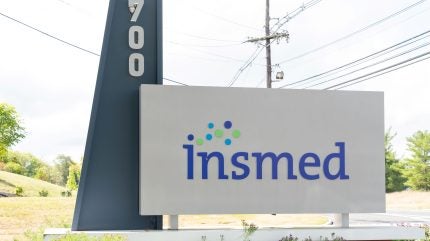
Insmed’s stocks more than doubled after the company announced its lead-pipeline candidate brensocatib succeeded in a Phase III trial.
The highly anticipated ASPEN trial (NCT04594369) was a global, randomised, double-blind, placebo-controlled Phase III study to assess the efficacy, safety, and tolerability of brensocatib in patients with non-cystic fibrosis bronchiectasis.

Discover B2B Marketing That Performs
Combine business intelligence and editorial excellence to reach engaged professionals across 36 leading media platforms.
Following the announcement, the companies’ stocks rocketed from $22.00 at close on May 24 to $49.65 at open on May 28. The price peaked on May 28 at $50.10.
Given the highly successful trial, the company will be filing a new drug application (NDA) with the US Food and Drug Administration (FDA) before the end of the year.
If approved, brensocatib would be the first approved treatment for patients with bronchiectasis, as well as the first approved dipeptidyl peptidase 1 (DPP1) inhibitor.
Insmed anticipates a US launch for brensocatib in mid-2025, followed by launches in Europe and Japan in the first half of 2026.

US Tariffs are shifting - will you react or anticipate?
Don’t let policy changes catch you off guard. Stay proactive with real-time data and expert analysis.
By GlobalDataIf approved, GlobalData forecasts that global sales of the pipeline candidate could hit $1.2bn in 2030.
GlobalData is the parent company of the Clinical Trials Arena.
Lead investigator and University of Dundee professor Dr James Chalmers said: “Today, there is no approved treatment for bronchiectasis and there remains an urgent need for a therapy that can reduce exacerbations.
“As a DPP1 inhibitor, brensocatib would be the first treatment in its class and could offer a completely new approach to managing this difficult-to-treat patient population, heralding a new era in the clinical management of bronchiectasis.”
The trial met the primary endpoint of reduction in pulmonary exacerbations in both the low and high dosage, with a 21% reduction in the low dose and 19.4% in the high dose. The trial also met most of the pre-specified secondary endpoints.
The candidate was well-tolerated in the study with the most frequent events being Covid-19, nasopharyngitis, cough, and headache.
In June 2020, brensocatib received Breakthrough Therapy Designation from the FDA and was later granted access to the Priority Medicines (PRIME) scheme by the European Medicines Agency (EMA).
Brensocatib is being investigated in other neutrophil-driven inflammatory diseases with significant health burdens and limited treatment options including granulomatosis with polyangiitis and chronic rhinosinusitis without nasal polyps (CRSsNP), and hidradenitis suppurativa (HS).
Bronchiectasis landscape
Cases of bronchiectasis in the eight major pharmaceutical markets (8MM: US, France, Germany, Italy, Spain, UK, Japan, and China) will increase from 3,782,252 cases in 2023 to 4,722,757 cases in 2033, a GlobalData report predicts.
There are currently no approved therapies for the treatment of bronchiectasis. All treatments for bronchiectasis patients are off-label antibiotics, bronchodilators, and mucolytics. As a result, there is an urgent need for more targeted, disease-modifying therapies for this patient population.





